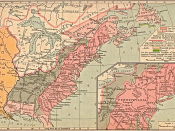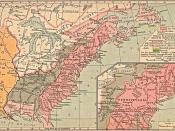Vortex of the American Revolution: The Seven Years' War
The Seven Years' War (1756-1763) gave Britain a decisive win over the French in North America. However, the triumph also initiated some unexpected disasters for Britain. It enlarged Britain's American domains to a size, which would have been difficult for any European monopoly to control, even under the best of circumstances. The declaration by Queen Elizabeth on July 6, 1976, "We lost the American colonies because we lacked the statesmanship to know the time and manner of yielding what is impossible to keep," is a tacit admission of the fact that the empire had grown unwieldy after the Seven Years' War and the failure of the motherland's diplomacy. This paper aims to bring out the facts to connect the Seven Years' War to be the main cause of the American Revolution. In 1754, George Washington, fighting under the British flag was rebuffed by French troops while attempting to free the Ohio River Valley to Britain.
Britain then ordered several thousand troops to North America. In 1755, the French and their Indian allies at Fort Duquesne defeated forces commanded by General Braddock. Humiliated, Britain declared war on the French in 1756 and arranged a huge military buildup and was rewarded with victories. In 1759, Britain captured Fort Niagara and Quebec. The fall of Montreal sealed the fate of the French. The Treaty of Paris was signed in 1763. The war had surfaced fissures in the relationship between the colonies and England. The colonies no longer needed protection from the French and Indian perpetrators and, therefore, did not need England. "The most sweeping of the victories of the colonies over the Crown were gained by assemblies during the Seven Years' War⦠Had they made the war upon the French with half the...


